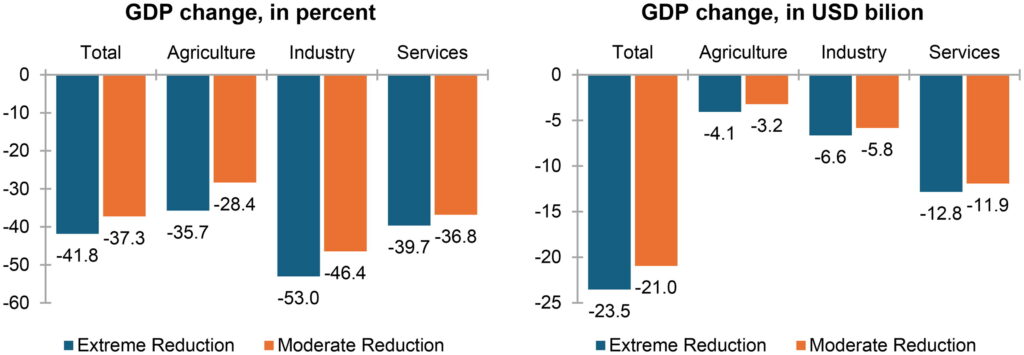A new study by researchers at the International Food Policy Research Institute (IFPRI) finds that if Sudan’s conflict continues through the end of 2025, the country could face catastrophic economic losses, widespread unemployment, and a dramatic rise in poverty, with women and rural populations hit hardest.
Published in The Journal of Development Studies, the paper uses an updated economywide model and data to simulate the economic and social consequences of Sudan’s ongoing conflict, which erupted in April 2023 between the Sudan Armed Forces and the Rapid Support Forces. The study estimates that Sudan’s gross domestic product (GDP) could contract by as much as 42% under an extreme scenario, compared to pre-conflict levels, with the agrifood system component of the GDP shrinking by more than one-third.
“The economic fallout of this conflict is both deep and widespread,” said co-author Khalid Siddig, a Senior Research Fellow at IFPRI and Program Leader for IFPRI’s Sudan Strategy Support Program. “Our analysis shows massive income losses across all households and a sharp rise in poverty, especially in rural areas and among women. Without urgent interventions, these impacts will persist long after the violence ends.”
Key findings from the study
- Sharp GDP decline: Under the extreme scenario, Sudan’s overall GDP is projected to fall by 42%, with the industrial sector shrinking by 53%, services by nearly 40%, and agriculture by 36%.
- Severe impact on agrifood system: The conflict has also had a severe impact on Sudan’s agrifood system GDP, which is projected to decline by 33.6 percent under the extreme scenario. Agriculture, agro-processing, and food trade and transport have all experienced substantial contractions, while food services recorded a slight increase, likely due to heightened demand from displaced populations.
- Drop in employment: The total national employment declined by 44.7 per cent, corresponding to a loss of 4.6 million jobs, with non-farm jobs most affected. The agriculture sector is projected to experience a 34.4 per cent reduction in employment, equating to a loss of 0.7 million jobs.
- Poverty surge: The national poverty rate could rise by nearly 19 percentage points, adding 7.5 million people to the ranks of the poor. Rural poverty is projected to rise by over 32 percentage points, with women disproportionately affected.
- Household incomes: Income losses are pervasive across all socioeconomic groups, with the lowest-income and least-educated households bearing the brunt.

Source: Authors’ compilation based on Sudan’s SAM Multiplier model.
The study emphasizes the far-reaching ripple effects of the conflict, including disruptions to health services, education, and food security. Over 25 million people in Sudan are currently facing acute food insecurity, according to recent assessments.
To mitigate these impacts, the authors call for urgent efforts to restore economic activity and livelihoods. Recommendations include support for the agrifood system, investments in employment recovery programs, and expanded social protection—especially for rural and female-headed households.
“Even if the conflict were to end tomorrow, the economic scars will take years to heal,” said lead author Mosab Ahmed, currently with UNICEF-Sudan, formerly with IFPRI Sudan Strategy Support Program. “But evidence-based recovery strategies—starting now—can help lay the foundation for long-term resilience and inclusive development.”
The study draws on Sudan’s most recent social accounting matrix (SAM), updated household survey data, and simulations of conflict-affected GDP scenarios through 2025. It provides a rare and detailed picture of the conflict’s toll on Sudan’s economy and people.
Citation: Mosab Ahmed, Mariam Raouf & Khalid Siddig (2025): What Are the Economic and Poverty Implications for Sudan If the Conflict Continues Through 2025? The Journal of Development Studies, https://doi.org/10.1080/00220388.2025.2510642
The International Food Policy Research Institute (IFPRI) provides research-based policy solutions to sustainably reduce poverty and end hunger and malnutrition. IFPRI’s strategic research aims to identify and analyze alternative international and country-led strategies and policies for meeting food and nutrition needs in low- and middle-income countries, with particular emphasis on poor and vulnerable groups in those countries, inclusive development, and sustainability. It is a research center of CGIAR, a worldwide partnership engaged in agricultural research for development. www.ifpri.org
Media inquiries: Evgeniya Anisimova, e.anisimova@cgiar.org, +1 (202) 627 4394

